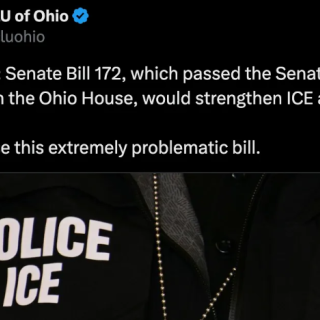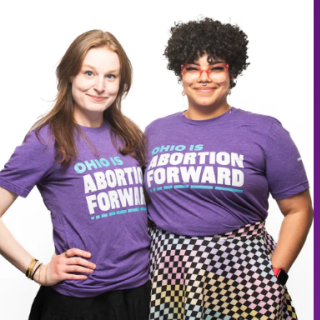Advertisement
Columbus City Council members opened up their emails on November 20 to find a letter from Leah Aden, Senior Counsel for the NAACP Legal Defense Fund (the “LDF”) calling for their attention. The LDF, which President Obama once called “simply the best civil rights law firm in American history,” sent a heavily footnoted letter to outgoing City Council President and future City Attorney Zach Klein announcing the “LDF is conducting a review of Columbus’ at-large electoral method for members of its city council. We have substantial concerns that this electoral method may violate Section 2 of the Voting Rights Act of 1965 … by denying voters of color in Columbus of the equal opportunity to elect their preferred candidates to this important local body.” In requesting a written response by December 18, Aden wrote “We write to provide the city council with this information so that this body can pursue an inclusive, fair course of action and avoid potentially costly and lengthy litigation that may be required to ensure compliance with Section 2 and other applicable laws.”
After the defeat of the citizen ballot initiative known as Issue 1 in August 2016, the LDF had sent Columbus an educational memo about the “racially discriminatory” nature of at-large elections. This information had been presented multiple times to the 2016 Charter Review Committee gathered by Mayor Ginther and Councilmember Hardin to review the issues raised by the citizen initiative, but the committee instead recommended an expansion of the racially discriminatory at-large system, whereby 9 districts would be created – but whose members would all be subject to city-wide (at-large) elections. The Voting Rights Act of 1965 was launched by President Johnson after the events of “Bloody Sunday” on the Edmund Pettus Bridge during the civil rights march from Selma to Montgomery, Alabama.
Among other things, it eliminated poll taxes, literacy tests, and grandfather clauses to ensure Blacks had an equal opportunity to participate politically, and it also severely restricted “unusually large” electoral districts, such as city-wide (at-large) elections where a large minority population has its votes submerged in a larger pool of majority/White votes.
Where there is evidence of racially polarized voting, at-large electoral schemes found to have resulted in vote dilution have been found to be unlawful under Section 2 of the Voting Rights Act of 1965. Section 2 has been called a legislative restatement of the equal protection clause of the constitution. The U.S. Department of Justice says that the majority of its enforcement work under Section 2 is against at-large election systems – indeed in January 2017 filed a lawsuit against Eastpointe, MI – and the LDF has itself litigated against such racially discriminatory at-large election systems in Louisiana, Alabama, and California, plus a landmark case in Georgia that resulted in more than 200 jurisdictions being ordered to abandon their at-large electoral systems.
But What About the Black Majority on Council?
Clintonville resident Miriam Bowers Abbott had initially contacted the LDF to express her concern that her “relative privilege as a White person” should not come at the expense of the collective voting power of Black Columbus. The LDF’s letter in response to Abbott’s inquiry must have come as a shock to council member Shannon Hardin, who on July 24, 2017 asked his fellow council members to join him in voting to put the Charter Review Committee’s expanded at-large proposal on the ballot (the proposal was tabled) and who had at a candidate forum in October expressed disdain at the notion that the at-large electoral system that seated he and the other three African American members of council could possibly be a racially discriminatory form of election as had been alleged. The LDF directly addressed this issue, mentioning Jennette Bradley as being the only recent African American council member initially elected to office (1991), and further saying
“All of the Black members currently serving on the city council were initially appointed and subsequently elected to the council as incumbents. This remains true even after the most recent city council election on November 7, 2017. In Thornburg v. Gingles, the U.S. Supreme Court recognized that ‘special circumstances, such as the absence of an opponent [and] incumbency,’ do not diminish the need for systemic reform. Consistent with that recognition, courts have found that appointments of minority individuals to elected positions in an at-large voting system may be indicative of impermissible vote dilution under Section 2.”
The issue raised by the LDF is that the Voting Rights Act does not concern itself with the skin color of elected officials, it concerns itself with the ability of large minority groups to elect candidates of their choice of any skin color. And rather than being evidence that the presence of (appointed) African Americans on council legitimizes a system of elections that has been discarded across the nation for its racially discriminatory effect, the LDF indicates that past courts have found in response to litigation that their very presence (gained by appointment) may be evidence of that discriminatory system in operation.
Columbus had four Black council members from 1882 to 1914, when the charter was adopted and moved the city from district-based elections to at-large elections. After the 1914 vote it was 55 years before another Black was elected to council (1969, Dr. John Rosemond). Around that time and since, both political parties have struggled to find ways to have Blacks serve on the at-large council. The LDF letter refers to the council’s history of making race-based appointments to a Black male seat, saying “Indeed, Columbus has been reputed to have informally recognized a ‘Black male’ seat (occupied initially by James Roseboro and Jerry Hammond, for which, after Ben Espy resigned,
Michael Coleman, Fred Ransier, Kevin Boyce, Troy Miller, and Shannon Hardin – all Black males, were subsequently appointed). In recognizing the history of the city council making mid-term appointments of Black men to that seat, Franklin County Democratic Party chairman Dennis White said: ‘they’ve had a tradition of doing that, and it seems as if that has worked out.’”
In a statement issued the day after the letter was released, this writer said on behalf of the citizen ballot issue Everyday People for Positive Change “The LDF letter tells us that Columbus’ practice of appointing African Americans to Council and running them as incumbents may be an indication of unlawful system, since it denies the Black community an equal opportunity to elect candidates of our own choosing. From my perspective, while it was most certainly well-intentioned decades ago, the continuation of this practice, which is the only way Black Democrats have come to council in nearly 40 years, creates a false illusion of Black political power when, in fact, every Black council member is elected by Columbus’ White majority which, in effect, divorces the Black community from its expected political leadership.” Columbus citizens should understand the racially charged history of at-large voting, and question why the only big cities that retain in are Columbus, and Portland, OR. (It should be noted that Oregon did not ratify the 15 th amendment to the constitution guaranteeing Black men the right to vote until 1959, though it had been adopted as a part of the constitution in 1870).
The LDF recognized that the council has the power to propose changes to the charter to move away from a racially discriminatory form of electing its council, and offered to consult with the council to aid it in doing so. It will be interesting to see if the current voting majority African American city council will accept the recommendations of the nation’s most storied a highly-regarded civil rights law firm and promote change, or if they will do what the LDF letter implies: continue to be a Black face on White money and power.
The public will find out on December 18, if the council responds to the NAACP Legal Defense Fund as requested: the safe money is on council continuing to support White Power at the expense of the voting power of the Black community. Willis Brown, a member of the Everyday People for Positive Change petition committee says, “we knew of this issue, and we are simply continuing with our effort as citizens to put real electoral reform on the ballot for a vote in May. Our proposal addresses this issue of Columbus’s racially discriminatory elections as well as many other problems in our election system, that have made fair and competitive elections an illusion for Columbus citizens. We hope the council either supports our efforts, or puts a fair elections proposal of their own on the ballot. It is far past time to retire this old and unjust elections system.”



